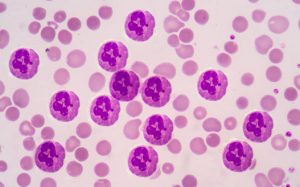 Neutropenia is a deficiency of neutrophils which can cause bacterial and fungal infections. Neutropenia is a blood condition which if categorized by a deficiency of neutrophils which are a type of white blood cell which helps ward of bacterial and fungal infections. Neutropenia is a granulocyte disorder which is a category of white blood cells produced in the bone marrow. These types of white blood cells digest invading bacteria and fungus as a key part of our immune system response and function.
Neutropenia is a deficiency of neutrophils which can cause bacterial and fungal infections. Neutropenia is a blood condition which if categorized by a deficiency of neutrophils which are a type of white blood cell which helps ward of bacterial and fungal infections. Neutropenia is a granulocyte disorder which is a category of white blood cells produced in the bone marrow. These types of white blood cells digest invading bacteria and fungus as a key part of our immune system response and function.
There are three types of granulocytes: neutrophils, eosinophils, and basophils. Nearly 50 to 70 percent of circulating white blood cells are neutrophils. Those with a neutrophils deficiency are more susceptible to bacterial and fungal infections which can lead to life-threatening neutropenic sepsis.
Advertisement
There are several types of neutropenia including:
- Congenital – a person it born with it
- Cyclic – neutrophil levels decreases every three weeks
- Idiopathic – no known cause is determined
- Autoimmune – the body destroys neutrophils cells
- Drug-induced – medications lower white blood cell count
Neutropenia causes
Depending on the type of neutropenia a person has that will determine the cause. For example a person can be born with it, their body may attack its own white blood cells, medications may be to blame or it can be determines as idiopathic. What is known is that neutropenia is a deficiency of neutrophils which are disease-fighting white blood cells. Even if a person is deficient in other types of white blood cells like eosinophils or basophils that is not referred to as neutropenia.
Neutropenia symptoms
 Neutropenia can often go symptomless and a person may not even know that they have the condition until they realize they are becoming ill more frequently. A blood test, too, can confirm a white blood cell deficiency which can contribute to neutropenia. Infections and symptoms of neutropenia can appear as:
Neutropenia can often go symptomless and a person may not even know that they have the condition until they realize they are becoming ill more frequently. A blood test, too, can confirm a white blood cell deficiency which can contribute to neutropenia. Infections and symptoms of neutropenia can appear as:
- Ulcers
- Abscesses
- Rashes
- Wounds that won’t heal or take extra long to heal
- Fever due to infection
- Mouth ulcers
- Gum infections
- Ear infections
- Painful urination
- Sore throat
- Abnormal pain, redness or swelling around a wound
As neutrophils continue to drop the risk of infection increases
Neutropenia treatment
Advertisement
Treatment for neutropenia is based on which type of neutropenia a person has and for this reason there are many ways to treat neutropenia which include:
- Discontinue the medications which may be lowering white blood cells
- Avoid toxins which may lower white blood cells
- Clearing up and resolving an infection
- Antibiotics
- Granulocyte colony stimulating factors (G-CSFs) which stimulate bone marrow to produce more neutrophils – this is use in congenital neutropenia
- Corticosteroids
- Bone marrow transplant
- Granulocyte infusion – type of blood transfusion where patient receives granulocyte cells
Neutropenia treatment diet
 There is a specific neutropenia diet which patients are recommended to follow as it can help them from harmful bacteria which are commonly found on food and in beverages. It is important that if you or someone you know has neutropenia that food is thoroughly cooked – especially meat – in order to kill of bacteria. Here are some general tips and suggestions in order to follow a neutropenia diet.
There is a specific neutropenia diet which patients are recommended to follow as it can help them from harmful bacteria which are commonly found on food and in beverages. It is important that if you or someone you know has neutropenia that food is thoroughly cooked – especially meat – in order to kill of bacteria. Here are some general tips and suggestions in order to follow a neutropenia diet.
- Avoid all fresh fruits and vegetables – canned, frozen and thoroughly cooked are best
- Avoid raw or under-cooked meat, fish and eggs – these items should be well done and not have runny yolks
- Avoid salad bars, fruits bars, and even deli counters – it’s best to buy vacuumed sealed deli meats instead of getting them fresh
- Avoid raw nuts
- Only consume pasteurized dairy products
- Avoid yogurt and items with live and active cultures
- Always take safety measures when handling food like washing your hands, not sing the same utensil on different items and ensuring surface areas are well disinfected
- Tap water is safe but if you opt for a bottle water ensure the following is listed on the label: reverse osmosis, distillation, or filtered through and absolute1 micron or smaller filter
By following these tips you can ensure you better protect yourself against harmful bacteria, fungus or parasites which can become life-threatening for a person with neutropenia as they have a weakened immune system.
